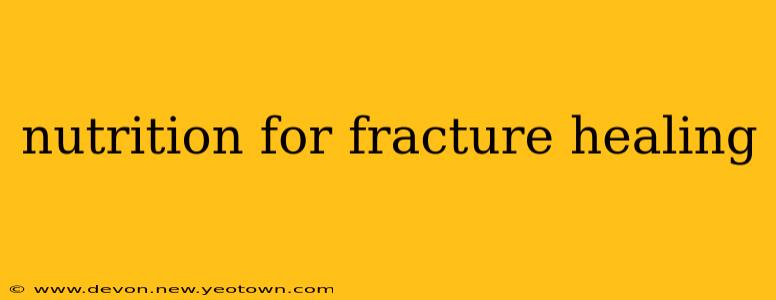Fractures. The very word conjures images of pain, immobility, and a lengthy recovery process. While medical intervention is crucial in setting and stabilizing a broken bone, the role of nutrition in fracture healing is often underestimated. It's not just about getting better; it's about optimizing the body's natural ability to mend itself, and that starts with what you put on your plate. This isn't just about eating more; it's about eating smart. Think of your body as a construction site, and your food as the high-quality materials needed to build strong, lasting repairs.
What Nutrients are Crucial for Bone Healing?
Think of bone as a dynamic living tissue, constantly being broken down and rebuilt. When a fracture occurs, this process accelerates, requiring a significant influx of nutrients to support the repair. Several key players take center stage in this intricate process:
- Calcium: The cornerstone of bone structure. Calcium deficiency significantly impairs bone healing, making the process slower and increasing the risk of complications.
- Vitamin D: Essential for calcium absorption. Without sufficient Vitamin D, your body struggles to utilize the calcium you consume, hindering bone repair.
- Vitamin K2: This often-overlooked vitamin plays a vital role in directing calcium to the bones, rather than letting it accumulate in soft tissues.
- Protein: The building block of all tissues, including bone. Protein provides the amino acids necessary for the formation of new bone cells.
- Phosphorus: Crucial for bone mineralization alongside calcium. Adequate phosphorus intake is just as important as calcium.
- Magnesium: Supports bone mineralization and the activity of bone cells. A deficiency can impact healing significantly.
- Zinc: Plays a crucial role in cell growth and protein synthesis, which is essential for bone formation.
- Vitamin C: Vital for collagen synthesis, a key component of bone tissue.
How Much Protein Do I Need for Fracture Healing?
This is a question many ask. The recommended daily allowance of protein for adults is typically around 0.8 grams per kilogram of body weight. However, during fracture healing, your needs increase significantly. Studies suggest a higher protein intake of 1.0 to 1.5 grams per kilogram of body weight can positively impact bone healing. This translates to a considerable increase for individuals recovering from fractures. Lean protein sources such as chicken, fish, beans, lentils, and Greek yogurt are excellent choices.
What About Vitamin D and Calcium?
Ensuring adequate intake of both Vitamin D and Calcium is critical. While dietary sources are helpful, many individuals may require supplementation, particularly those with limited sun exposure or dietary restrictions. A blood test can determine your levels, guiding your doctor in recommending the right dosage.
Are There Specific Foods to Focus On?
Absolutely! Building a diet that supports bone healing involves incorporating a variety of nutrient-rich foods:
- Dairy Products: Excellent sources of calcium and protein.
- Leafy Green Vegetables: Rich in calcium, Vitamin K, and other essential minerals.
- Fatty Fish: Excellent sources of Vitamin D and Omega-3 fatty acids, which have anti-inflammatory properties that can benefit healing.
- Legumes: Packed with protein and essential minerals.
- Nuts and Seeds: Good sources of magnesium, zinc, and other minerals.
- Fortified Foods: Many cereals and plant milks are fortified with calcium and Vitamin D.
Can Certain Foods Hinder Fracture Healing?
While focusing on beneficial foods is essential, some substances can negatively impact the healing process. Excessive caffeine and alcohol consumption can interfere with calcium absorption and overall bone health. Additionally, a diet high in processed foods and low in nutrients can hinder recovery.
What About Supplements? Should I Take Them?
Supplements can be helpful, especially if dietary intake is insufficient to meet increased nutritional needs. However, it's crucial to consult your doctor or a registered dietitian before taking any supplements. They can assess your individual needs and determine if supplementation is necessary and appropriate.
Does Smoking Affect Bone Healing?
Yes! Smoking significantly impairs bone healing. Nicotine restricts blood flow, reducing the delivery of essential nutrients to the fracture site and slowing down the healing process. Quitting smoking is crucial for optimal recovery.
Fracture healing is a complex process, and nutrition plays a pivotal role. By focusing on a balanced diet rich in the essential nutrients discussed above and avoiding detrimental habits, you're giving your body the best chance to repair itself effectively and efficiently. Remember, consulting with your doctor or a registered dietitian is always recommended to personalize your nutritional plan based on your specific needs and the type of fracture you've sustained. Your body's repair crew needs the right supplies—give them what they need to build you back stronger than ever.

